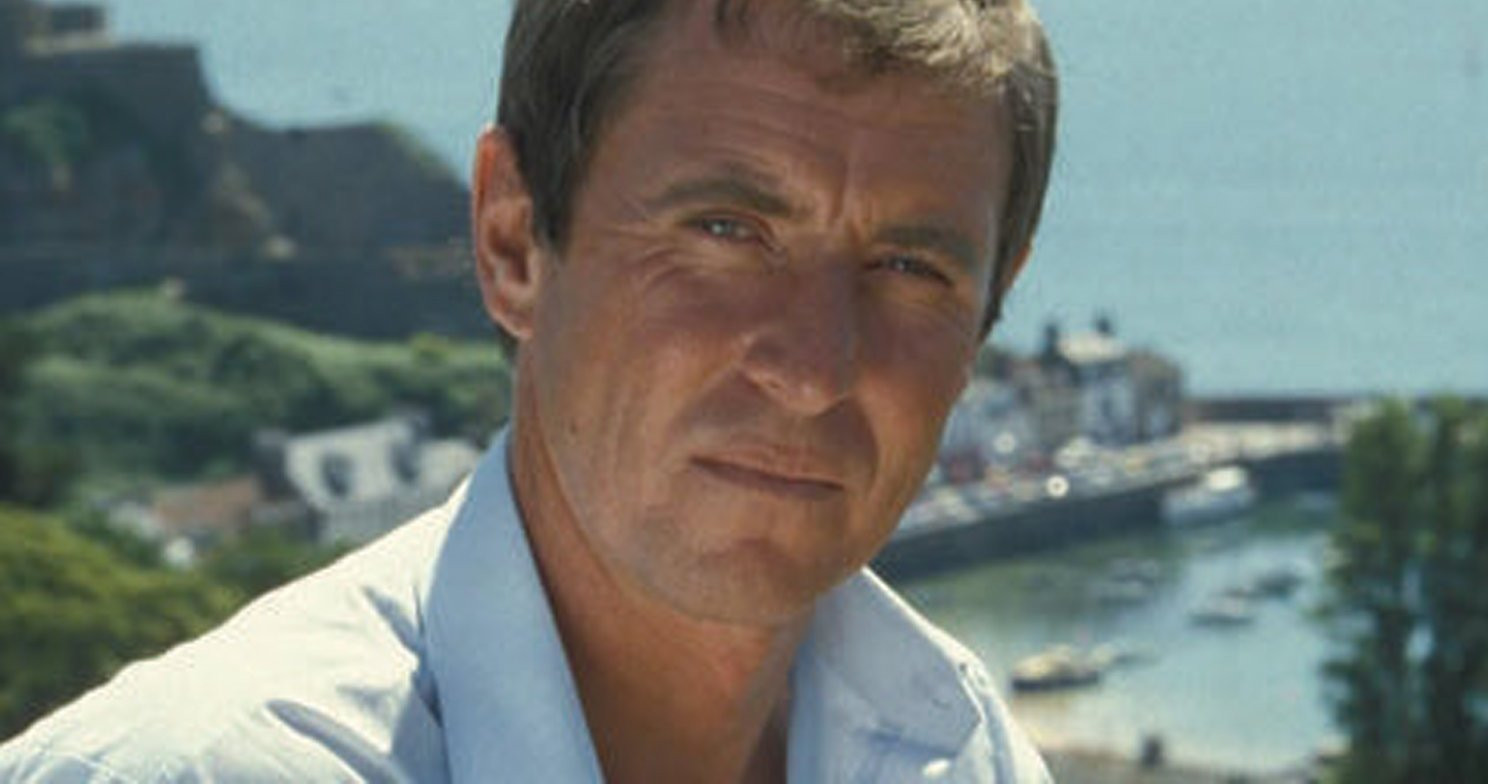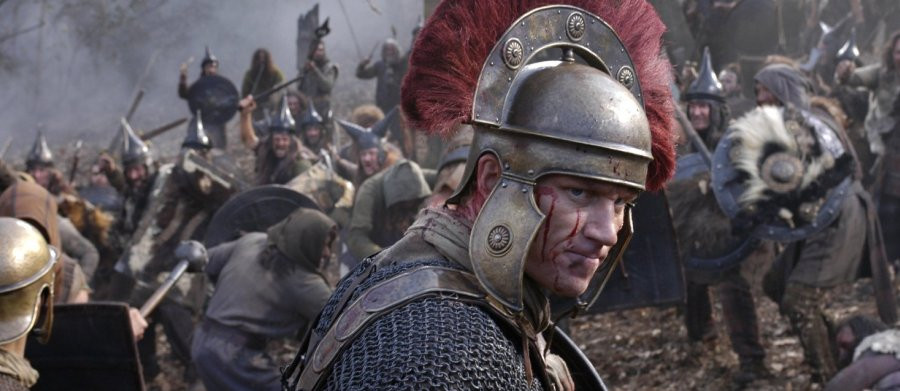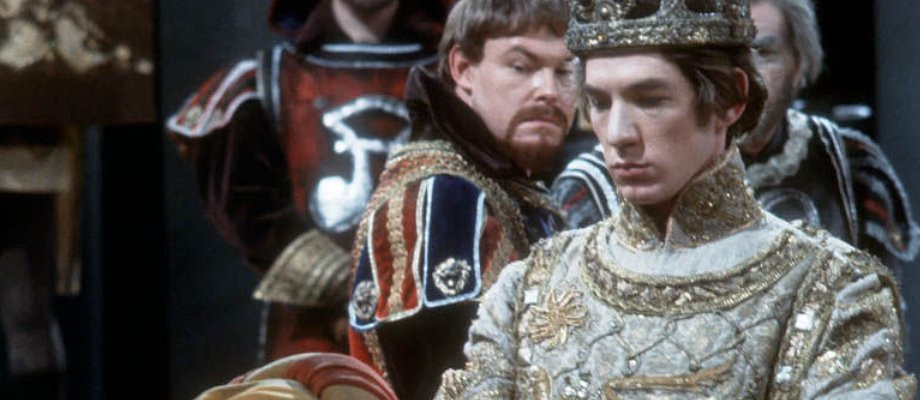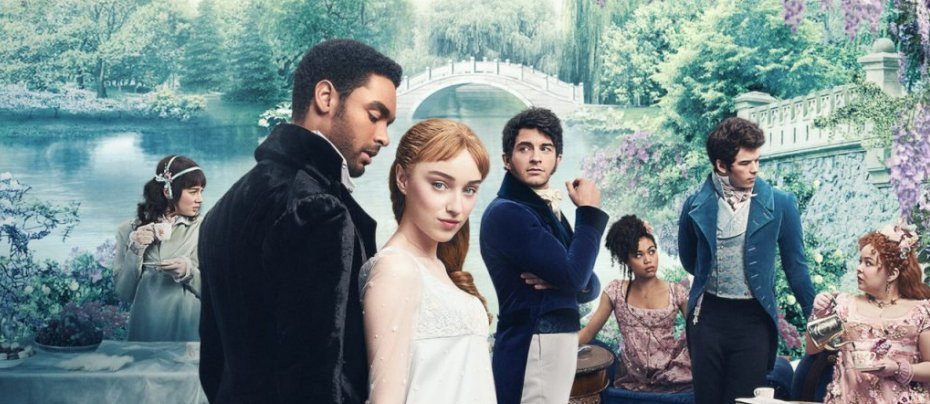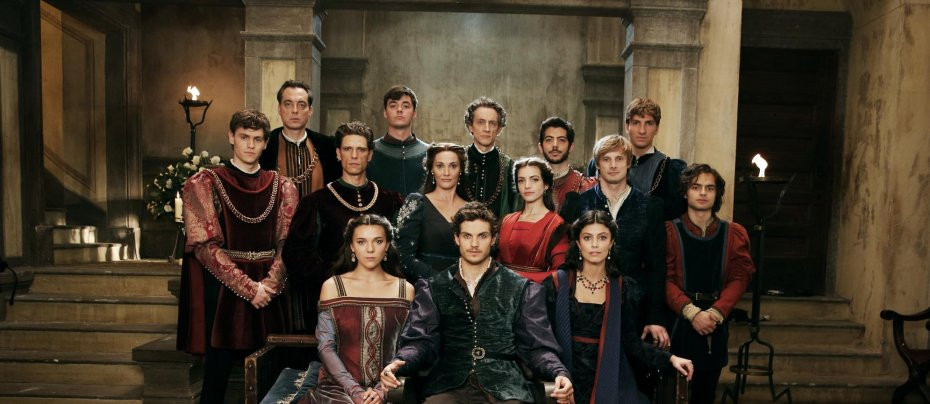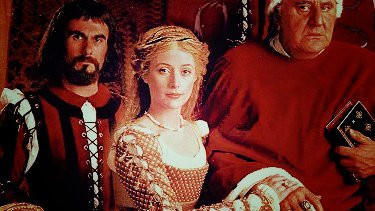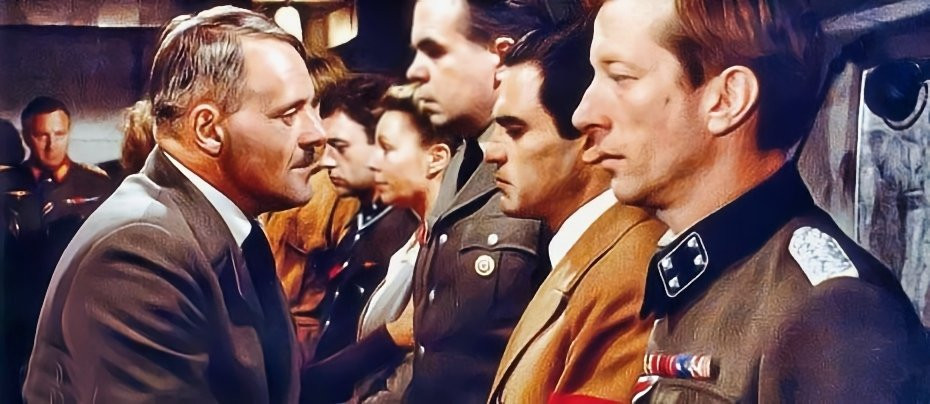
The Bunker
1981 - United StatesReview by John Winterson Richards
In the 1984 German television film Die Wannseekonferenz, known in English as The Wannsee Conference, about planning the Shoah, the odious Reinhard Heydrich, is given a line which the subtitles translate as "Victory or Death!" However the word translated as "Death" sounded more like""Untergang" than "Tod," the actual German word for death. By a delicious irony, that may have been deliberate, Der Untergang also happens to be a 2004 feature film about Adolf Hitler's last days as his Empire crumbled around him until it was little more than a bunker in Berlin. This is the film, known in English as Downfall, which provides the source material for all those ranting Hitler memes.
Watching, and then reviewing, The Wannsee Conference left your reviewer with something of a foul aftertaste and a desire for closure. It would have been pleasant to see its whole cast of characters get their comeuppance, but, sadly, history is rarely that neat. Instead the next best thing is seeing their boss get his just desserts. In this respect television beat Downfall to it by a couple of decades with The Bunker, starring Anthony Hopkins as Hitler, covering much the same events as the later film.
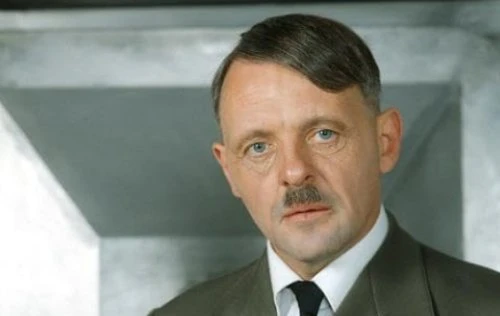
Although The Bunker made a very strong impression when it was first shown, revisiting it after forty years, the first thing that has to be admitted is that it does not compare well with Downfall. This is, of course, to be expected. Technology has moved on a lot and so has technique. Moreover, while in some respects daring for its time, The Bunker is nevertheless subject to the restrictions of American television of that time where The Downfall, as a cinematic release, can be more graphic in depicting the horror of war. Most of all, as a German film, Downfall is more realistic, not least because the Germans have a better grasp of the nuances of their own society, culture, and history.
It also has to be said that Bruno Ganz in Downfall is far more convincing as the broken Hitler than Hopkins in The Bunker. This is no disrespect to Hopkins. His status as one of the greatest actors of his generation, arguably one of the best of all time, is beyond dispute. It is simply that Ganz is closer to the historical Hitler at this point, and the fact that he is a German actor playing a German naturally gives him greater authenticity. It does not help that we have become more familiar with Hopkins on screen since 1981 and more conscious of certain Hopkinsisms. A severe critic of his own work, which he apparently avoids rewatching, Hopkins has been quoted as saying that he is pleased with very few of his performances. Although he has not published a list of those performances, it may be safe to assume that his Hitler is not on it. This is not to say it was a bad performance, just not the best. It was nevertheless much acclaimed at the time, winning Hopkins a Best Actor Emmy, even if he might have come through the middle of not only a split vote but two, since his competition was two actors nominated from each of two splendid miniseries that year, Shogun and Masada.
It is now therefore impossible to view, and review, The Bunker other than through the lens of the superior later product, Downfall. This is unfair but such is the nature of cultural development, or at least it ought to be. Incidentally, Downfall also had what may be the best newspaper advertisement ever for a television show when it was aired on Channel 4, a picture of the protagonist and the words "It's a happy ending - he dies."
That could also have been an appropriate "strapline" for The Bunker. Most of the entertainment value of the project is derived from the schadenfreude of witnessing an obnoxious character's descent into absolute despair as a direct consequence of his own actions. One would usually feel guilt at watching the prolonged suffering and total disintegration of a fellow human being but, in this case ...well, Hitler.
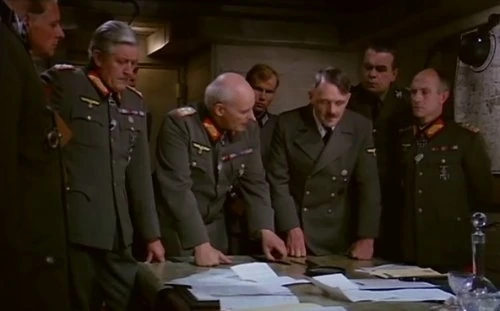
We get to see Hitler's gradual realisation that all the desperate hopes on which he had been relying were delusions, fed by his own wishful thinking and the reluctance of those around him to give him bad news. That growing realisation is shared by the most fanatical of his supporters, who maintained an irrational confidence in Hitler almost to the very end.
The plot serves as a psychological case study in "group think" and the human capacity for self deception, both collective and individual. With hindsight, it should have been obvious as far back as 1942 that Hitler could not win the War so long as the Allies remained allies. Hitler himself seems to have accepted this at some level, pinning his hopes on the Allies falling out and on an almost mystical belief that this would lead to a diplomatic revolution like "The Miracle of the House of Brandenburg" that had saved Frederick the Great after a change of government in Russia. We see how Hitler rejoiced in the death of President Franklin Roosevelt, believing it was the beginning of the process, that new leadership in the United States would make it more likely that America and Britain would see Germany as a natural ally against Russia. He was not entirely wrong in his assumptions: his arch opponent Winston Churchill lost power soon after and the Allies were indeed beginning to fall out, but by that stage it made no difference. The nationalist nature of the War, the uncontrollable forces Hitler himself had unleashed, meant there was no stopping it then until Hitler and Germany were done.
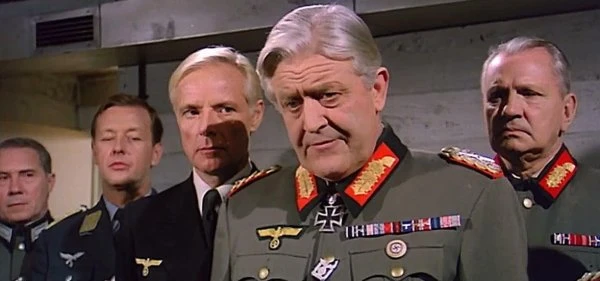
While indulging himself in high diplomatic fantasies, Hitler is in denial about what his happening almost literally on his doorstep. Berlin is falling to the Russians. He refuses to leave. Instead he sends orders to Generals commanding armies that exist only on paper to march to his rescue. Still he clings desperately to power, turning viciously on his principal lieutenants, Goering and Himmler, when they try to fill the leadership vacuum caused by his letting himself be cut off in Berlin.
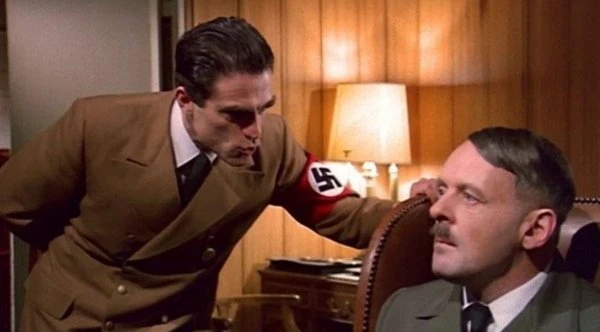
Finally, in a famous pivotal scene, Hitler is told that a force he has designated "Combat Group Steiner" - in fact little more than three battered battalions - is simply incapable of taking the offensive against two Russian Army Groups as his plans require and he realises the War is irretrievably lost. Egotist to the end, rather than take responsibility and face the consequences of his actions, he dictates a "testament" that blames everyone but himself and resolves on an act of Wagnerian self immolation. He commits suicide, together with his new wife and some of his closest associates, including Josef Goebbels and his wife, who kill their own children first. It is the final confirmation of their nihilism. Hitler even has his beloved dog killed.
Where Downfall views these events principally from the perspective of Hitler's relatively sympathetic secretary, The Bunker seems uncertain of its point of view. A pointless framing device introduces us to the American journalist on whose book the script is based, and whose voice is heard in some unnecessary narration, but this detracts from all sense of immediacy.
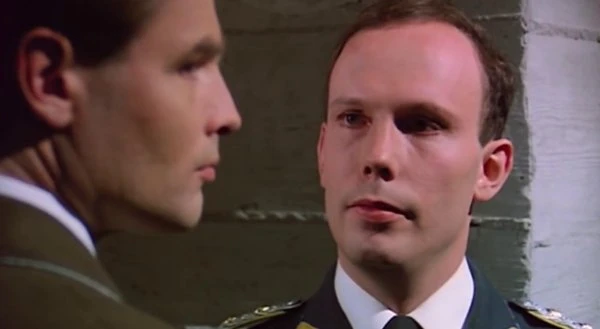
Among the characters actually in the Bunker great emphasis is placed on Albert Speer, then Minister of Armaments. Since he is played by the handsome American leading man Richard Jordan, a great talent lost far too soon, we are evidently meant to see him as the closest thing in this to a hero, and the script is very kind to the historical Speer in taking his unlikely version of events at face value. This was at the height of Speer's undeservedly successful campaign to rehabilitate himself. History has since taken a far more cynical view of him.
Jordan's fellow Americans Cliff Gorman and Piper Laurie are far more convincing as Goebbels and his even more fanatical wife Magda. Susan Blakely plays Eva Braun, Hitler's astonishingly loyal mistress who chose to marry him in his last days and die with him. Much of the rest of the supporting cast consists of familiar British faces.
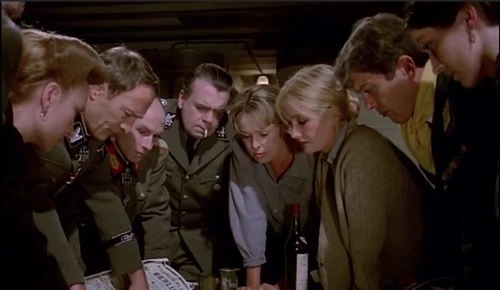
Martin Jarvis and Michael Kitchen, both rising actors at the time, add a much needed human element as the "below the stairs" staff trying to keep the dodgy generator and telephone system working as their world collapses. Julian Fellowes, now Lord Fellowes, plays Hitler's Luftwaffe Adjutant, von Below, very effectively as a semi detached aristocrat. Terrence Hardimann is Hitler's SS Adjutant and almost brother-in-law, the ill fated Fegelein, while his fellow Cadfael cast mate Michael Culver is the competent garrison commander. David Swift (Drop the Dead Donkey) is the commander of Hitler's bodyguard, Pam St Clement (EastEnders) is Hitler's nostalgic personal cook, Edward Hardwicke (The Case Book of Sherlock Holmes) is Speer's very convenient friend and later mutual alibi, Robert Austin (Mighty Moments From World History) is a nervous registrar called on to perform an officious National Socialist civil wedding at short notice, and Tony Steedman (Citizen Smith) is Colonel General Alfred Jodl, Chief of the Armed Forces Operations Staff. Curiously, Steedman also played Jodl in an earlier production, The Death of Adolf Hitler in which Frank Finlay attempted bravely to explore Hitler in greater depth.
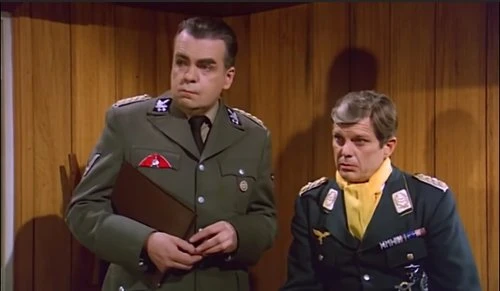
The most interesting performance comes, perhaps predictably, from that superb French actor Michel Lonsdale as Martin Bormann. It sometimes seems a mystery how the colourless Bormann came to have such power in the National Socialist hierarchy: Lonsdale's quietly imposing presence suggests a credible solution to that mystery. There is an air of undefined menace to the man that nevertheless melts away until he is left no more than another impotent refugee. It has since been established that Bormann was yet another suicide.
That all authority is ultimately ephemeral is the central theme of The Bunker. Although it cannot be as vivid as Downfall in depicting the full squalor of conditions in the cramped bunker, we do get a fine sense of the contrast between the remaining trappings of power, including a very symbolic portrait of an elderly Frederick the Great, and the destruction and despair all around. Hitler and his cronies are not as cut off from the outside world as they would like to be. Overall, The Bunker achieves what it set out to do very effectively, and if it has been overtaken in most respects by Downfall it still deserves credit for having been a superior production of its time with a very strong cast, all of whom are credible in their roles.
Seen this show? How do you rate it?
Seen this show? How do you rate it?
Published on March 6th, 2024. Written by John Winterson Richards for Television Heaven.



